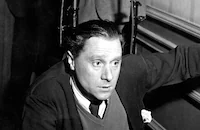The Young Mr. Pitt
Cast & Crew
Carol Reed
Geoffrey Atkins
Robert Donat
Jean Cadell
Robert Morley
Phyllis Calvert
Film Details
Technical Specs

Synopsis
In 1783, the English Parliament is led by the coalition of Charles James Fox and Lord North. King George III, who dislikes them, is pleased when they begin to lose power and decides to install William Pitt, the Younger as prime minister. Pitt, whose famous father, the Earl of Chatham, was an important statesman, is only twenty-four years old, however, and his fellow politicians refuse to take him seriously. Pitt is nonetheless determined to rid Parliament of corruption and restore England as a major world power, and so forces a general election. After Pitt is overwhelmingly supported by the general populace, he is installed in 10 Downing Street and works hard to promote reform, including strengthening England's Navy. Meanwhile, in France, Napoleon Bonaparte studies at military school. Although Pitt appears to care only for his work, he falls in love with lovely Eleanor Eden, the daughter of ambassador Lord Auckland. Time passes as Pitt continues in his post, while in France there is much upheaval. After France declares war against Austria and invades Belgium, Pitt is visited by Tallyrand, an envoy from Napoleon. Tallyrand invites England to join with France in conquering the world, but Pitt refuses, adding that England will stand by its promise to aid Holland if it is attacked. The years pass as England becomes enmeshed in war with France, and Pitt's delicate health begins to fail as he spends long hours planning fighting strategies while also looking after the general welfare of the country. Pitt's popularity wavers when Tallyrand offers to negotiate a peace treaty, which Pitt rejects. Pitt knows that the offer is not sincere, and his suspicions are proven correct when Napoleon redoubles his war efforts. Meanwhile, Pitt's personal life continues to suffer as inattention to his own finances result in his accumulation of huge debts. He also must end his romance with Eleanor, for he knows that he will never be free to marry her. Determined to defeat Napoleon in the Mediterranean, Pitt entrusts Admiral Horatio Nelson with the assignment, despite the opposition of Fox and others. Nelson achieves a decisive victory, however, and later, Napoleon again makes an offer of peace. Napoleon's intention is to divide and pacify the English people while he builds his military strength, and his aim succeeds when Pitt is forced out of office. After Eleanor marries another man, and Addington takes over as prime minister, Pitt settles down to a semi-retirement in the country. A few years pass as France's hostilities grow, and soon even Fox pleads with Pitt to return to the government. Pitt's doctor warns him that he will die if he resumes the stress of leadership, but Pitt becomes prime minister again. Pitt enjoins Nelson to battle Napoleon's Navy, and in 1805, at the cost of his own life, Nelson is victorious at the sea battle of Trafalgar. Pitt wearily watches the celebrating populace, and at a dinner given in his honor, refuses to accept any adulation by saying that England has saved herself through the people's exertions. The gravely ill Pitt then indulges in a glass of his beloved port rather than take his medicine.

Director

Carol Reed
Cast
Geoffrey Atkins

Robert Donat
Jean Cadell

Robert Morley

Phyllis Calvert

Raymond Lovell
Agnes Loughlan

John Mills

Felix Aylmer
Ian Mclean
Max Adrian
Bromley Davenport
John Salew

Herbert Lom
Albert Lieven
Stephen Haggard
Stuart Lindsell
Henry Hewitt
Frederick Culley

Frank Pettingell
Leslie Bradley
Roy Emerton

Hugh Mcdermott
Alfred Sangster
Crew
Cecil Beaton
Edward Black
Viscount Castlerosse
R. E. Dearing
Sidney Gilliat
E. Haffenden
C. H. Hartman
Frank Launder
Louis Levy
Maurice Ostrer
W. T. Partleton
Alfred Roome
B. C. Sewell
Vetchinsky
Frederick Young

Film Details
Technical Specs

Quotes
Trivia
Notes
The working title of this film was Pitt, the Younger. The opening credits note that "The speeches by the Earl of Chatham and William Pitt in the Houses of Parliament are authentic." Although the opening credits indicate that Twentieth Century Productions, Ltd. copyrighted the film in 1942, the film is not included in the Catalog of Copyright Entries. According to 1942 Hollywood Reporter news items, the picture, which cost a million dollars and was the most expensive film to date produced abroad by Twentieth Century-Fox, was to have been released in the United States in October 1942, but was delayed until early 1943. The Variety review, which was written in London on June 16, 1942, lists the film's running time as 118 minutes, and studio publicity material, located at the BFI, gives the picture's original British release footage as 10,643. The film is based on the life of William Pitt, the Younger (1759-1806), who, at the age of twenty-four, became England's youngest prime minister. He held office from 1783 to 1801 and from 1804 to 1806. In 1938, Harry Piel directed and starred in a German film about Pitt's life entitled Der unmögliche Herr Pitt.












